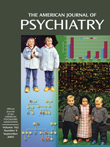Intravenous Quetiapine Abuse
To the Editor: There are recent reports in the literature describing the intranasal abuse of quetiapine among jail inmates, who may obtain it by reporting malingering psychotic symptoms and who refer to it as “quell” (1).
Ms. A was a 34-year-old woman with a history of polysubstance dependence (alcohol, cannabis, and cocaine), depressive episodes associated with multiple suicide attempts, and borderline personality disorder who was incarcerated after conviction on charges of physical assault and possession of controlled substances. She had a history of incarceration on multiple occasions for similar charges. She complained of difficulty sleeping, poor impulse control, irritability, and depressed mood. For these symptoms, she was given oral quetiapine, 600 mg at bedtime. On one occasion, she took the pills provided to her but did not ingest them. Instead, she crushed the two 300-mg tablets, dissolved them in water, boiled them, drew the solution through a cotton swab, and while lying in bed, covered by blankets, intravenously injected the solution.
Twelve hours later, she was awoken by facility guards who found the syringe she used still in place on her arm. She informed the guards that she had intravenously injected herself with quetiapine the previous evening and became rapidly sedated, falling asleep before she could remove the syringe. She additionally admitted to previous intranasal abuse of crushed quetiapine tablets. Apart from “the best sleep I ever had,” she described no dysphoric, euphoric, or other effects.
This description lends support to findings by other investigators of an increased risk of abuse of prescription medication in individuals who have a history of substance abuse or dependence (2). It is conceivable that such a progression from the use of quetiapine to its abuse either intranasally or intravenously is more prevalent than is currently assumed. This may be particularly apt in settings in which the prescription of sedative agents, such as benzodiazepines, barbiturates, and stimulants, is decreasing secondary to concerns of abuse and resale, e.g., prison settings and substance abuse treatment programs and among school-age children. The calming and sedating effects of quetiapine, which make it useful in clinical practice, also make it a substance of abuse and confer “street value” on it by the same token.
Quetiapine treatment has been demonstrated to be associated with prolonging abstinence and decreasing the number of hospitalizations in patients with alcohol dependence and posttraumatic stress disorder (3). This is hypothesized to be related to the impact of quetiapine on improving disturbed sleep but may also be related to a direct action of quetiapine in reducing the use of alcohol. The awareness of the “extra-antipsychotic” effects of quetiapine provides potential areas for further clinical research for understanding the treatment of substance abuse and anxiety disorders.
1. Pierre JM, Shnayder I, Wirshing DA, Wirshing WC: Intranasal quetiapine abuse (letter). Am J Psychiatry 2004; 161:1718Link, Google Scholar
2. Buhrich N, Weller A, Kevans P: Misuse of anticholinergic drugs by people with serious mental illness. Psychiatr Serv 2000; 51:928–929Link, Google Scholar
3. Monnelly EP, Ciraulo DA, Knapp C, LoCastro J, Sepulveda I: Quetiapine for treatment of alcohol dependence. J Clin Psychopharmacol 2004; 24:532–535Crossref, Medline, Google Scholar



